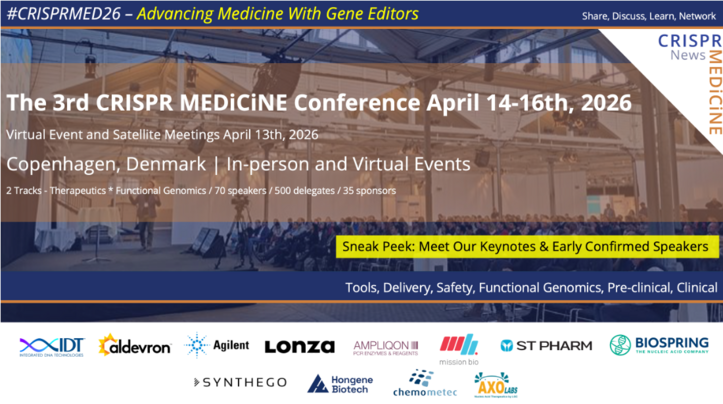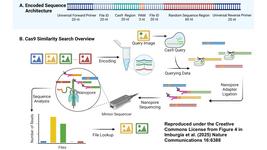CMN Weekly (11 August 2023) - Your Weekly CRISPR Medicine News
By: Karen O'Hanlon Cohrt - Aug. 11, 2023
Top pick
- Scientists in the U.S. and Australia have engineered bacteria that can detect tumour DNA in living mice. The newly developed assay, Cellular Assay for Targeted CRISPR-discriminated Horizontal gene transfer," or "CATCH", relies on bacteria already present in the colon to signal the presence of free-floating DNA released from colorectal tumours. The bacteria were armed with a CRISPR system designed to distinguish between wild-type and mutated copies of the KRAS gene, which is often mutated in colorectal cancer. In the setup, only bacteria that had taken up mutant forms of KRAS would survive to signal or respond to the disease. The approach is an advance on previous strategies to detect tumour DNA using bacteria, which could not identify specific cell-free DNA sequences and mutations. The findings were published yesterday in Science.
Research
- Glioblastoma (GBM) is the most common malignant brain tumour and is often described as being "immunologically cold", i.e., not easily detectable by the immune system. In an attempt to make GBM more visible to the immune system, a team of researchers in Japan focused on the immune checkpoint molecule cytokine-inducible SH2-containing protein (CISH, or CIS) as a critical negative regulator in natural killer (NK) cells, which are increasingly gaining attention in immunotherapeutic strategies for cancer. They found that knocking out the CIS-encoding gene using CRISPR-Cas9 led to increased interferon (IFN)ɤ and tumour necrosis factor (TNF) production, as well as enhanced NK cell-mediated apoptosis induction against allogeneic GBM cells and spheroids. When administered intracranially, the CIS-deleted allogeneic allogeneic NK cells prolonged overall survival of xenograft brain tumour mice. Their findings were published yesterday in Journal of Experimental & Clinical Cancer Research.
- A recent study by researchers in the U.S. found that non-viral base editing of mutations in the KCNJ13 gene, which cause early-onset retinal dystrophy, preserves vision in a mouse model of inherited retinal channelopathy. Using silica nanocapsules (SNC) as a vehicle, they delivered adenine base editor (ABE8e) mRNA and single-guide RNA to patient fibroblasts and human-induced pluripotent stem cell-derived retinal pigment epithelium (RPE), which resulted in precise and efficient correction of the KCNJ13W53X/W53X mutation. Phenotypic analysis in cells and mice treated with SNC-delivered base editing reagents revealed normal visual function and preserved retina structure. The findings were published yesterday in The Journal of Clinical Investigation.
- In an article published in Gene Therapy, researchers in Switzerland report a targeted shock-and-kill HIV-1 gene therapy that has the potential to eliminate HIV-1-infected cells in a HIV-1 and T cell-specific manner. Their strategy combined a CRISPR activation (CRISPRa) system with gRNA-V (a HIV-1 specific gRNA), a truncated Bid (tBid)-encoding suicide vector, and CD3-retargeted adenovirus delivery vectors, which have been shown to successfully transduce human T cell in various settings. When tested in a cellular model for HIV-1 latency, the team observed specific elimination of latently HIV-1-infected cells. tBid is a truncated form of the human pro-apoptotic protein Bid, whose activity is highly dependent upon the HIV-1 accessory proteins Tat and Rev. When tBid is activated, it leads to specific, efficient and rapid killing of HIV-1 infected cells.
- In a study published in Nature Communications this week, researchers in the United States and Germany report using CRISPR-Cas9 to develop a new dendritic cell therapy that speeds up wound healing in mouse models. The team first identified Ndrg2 in single-cell RNA sequencing experiments as a potential CRISPR target, and then knocked it out in murine dendritic cells using CRISPR-Cas9. When integrated into a therapeutic hydrogel for in vivo cell delivery, the new strategy resulted in accelerated healing of full-thickness wounds in both non-diabetic and diabetic mouse models.
Industry
- SNIPR Biome announced this week that it has extended its collaboration with Novo Nordisk to continue advancing its microbial gene therapy approach. According to that press release, the aim of the collaboration is to establish pre-clinical proof of SNIPR's concept for a novel target within cardiometabolic disease.
- ERS Genomics and Santa Cruz Biotechnology announced yesterday that they have entered a CRISPR-Cas9 licencing agreement. The licence allows Santa Cruz Biotechnology to develop and commercialise products using CRISPR-Cas9 technology. ERS is founded by Nobel laureate Dr. Emmanuelle Charpentier, and its patent portfolio is the most comprehensive collection of proprietary rights to CRISPR-Cas9 gene editing technology.
Second quarter 2023 financial updates from gene-editing companies
- Beam Therapeutics reports pipeline updates on its base-editing therapeutic candidates and second quarter 2023 financial results. Among the highlights were that the ongoing Phase 1/2 (BEACON) clinical trial of BEAM-101 in sickle cell disease is progressing with consented patients projected to fill a sentinel cohort and to initiate an expansion cohort. Data from this trial is expected in 2024. The company also reports that the first patient is consented to be dosed in the company's second clinical-stage programme, BEAM-201, for the treatment of T-cell acute lymphoblastic leukaemia/T-cell lymphoblastic lymphoma.
- CRISPR Therapeutics provides a business update and reports second quarter 2023 financial results. The company has multiple clinical-stage gene-editing programmes spanning diverse therapeutic areas including haemoglobinopathies, immunooncology and regenerative medicine. Its front-runner candidate, exa-cel, an ex vivo CRISPR-edited cell therapy designed to treat sickle cell disaese and beta-thalassemia, is currently in the running to become the first ever approved gene-editing therapy, with a decision expected from the FDA later this year.
- Poseida Therapeutics provides financial results for the second quarter of 2023. Also this week, the company announced a strategic investment by Astellas and provided a business update. The $50 million strategic investment by Astellas is comprised of the purchase of common stock for an aggregate purchase price of $25 million and an additional $25 million one-time payment for certain strategic rights. Updates on Poseida's three clinical-stage allogeneic CAR-T therapy candidates for cancer are expected in early-to-mid 2024.
- Precision BioSciences reports second quarter 2023 financial results and provides a business update. The company reported that a Type B meeting with the FDA, held in June 2023, provided clarity on the development of its sole-clinical-stage candidate azer-cel, including a potential pathway toward registration. Azer-cel is an allogeneic meganuclease-edited CD19-targeting CAR-T cell therapeutic candidate designed to treat relapsed or refractory Non-hodgkin lymphoma.
- Fate Therapeutics reports second quarter 2023 financial results and business updates. Among the updates were that Phase 1 study start-up is ongoing for FT522, the company's alloimmune defense receptor (ADR)-armed, CD19-targeted CAR natural killer cell programme for B-cell lymphoma, with the dose escalation portion of the study dsigned to assess a 3-dose treatment schedule with and without conditioning chemotherapy. FT522 is an off-the-shelf, multiplexed-engineered, induced pluripotent stem cell (iPSC)-derived natural killer cell product candidate that incorporates five synthetic controls of cell function.
- Prime Medicine reports second quarter 2023 financial results and provides business updates. The company is advancing a pipeline of eighteen therapeutic programmes involving prime editing, and according to the update, is on track to initiate investigational new drug-enabling studies of PM359, its development candidate for chronic granulomatous disease, in 2023.
- Sangamo Therapeutics reports recent business highlights and second quarter 2023 financial results. Amongst other updates, the company announced a research evaluation and option agreement with Chroma Medicine to explore zinc finger proteins for epigenetic editing in specified targets outside of the central nervous system in exchange for an upfront payment.
- Iovance Biotherapeutics reports second quarter and first half 2023 financial results and corporate updates. The company's extensive pipeline includes one clinical-stage gene-edited programme, IOV-4001, which is a PD-1-inactivated tumour-infiltrating lymphocyte (TIL) therapy designed to treat previously treated advanced melanoma or metastatic non-small cell lung cancer. The ongoing IOV-GM1-201 trial of IOV-4001 is among the first clinical trials of a genetically-modified TIL cell therapy for solid tumours.
- Vor Biopharma reports second quarter 2023 financial results and provides a company update. The company's genome-edited allogeneic haematopoietic cell transplant, VBP101 (trem-cel, and formerly known as VOR33), will be evaluted in a Phase 1/2 clinical trial that is actively enroling patients, with new data expected by year-end 2023. VBP101 is edited to lack the CD33 protein, and is designed to replace standard of care transplants for patients suffering from acute myeloid leukaemia and potentially other blood cancers.
News from CRISPR Medicine News
- In this week's clinical trial update, we shared news from AvenCell Therapeutics (U.S.), which recently announced that the European Medicines Agency has approved its clinical trial application for AVC-201, a novel CRISPR-edited and switchable allogeneic CAR-T therapy for the treatment of various blood cancers. Read more in our update here.
To get more CRISPR Medicine News delivered to your inbox, sign up to the free weekly CMN Newsletter here.
Tags
CLINICAL TRIALS
IND Enabling
Phase I
Phase II
Phase III
Recurrent or Progressive High-grade Glioma, (NCT06737146)
Sponsors:
Suzhou Maximum Bio-tech Co., Ltd.
Sponsors:
Suzhou Maximum Bio-tech Co., Ltd.
IND Enabling
Phase I
Phase II
Phase III
Advanced Peritoneal Malignancies or Abdominal Metastatic Solid Tumors, (NCT06912152)
Sponsors:
Zhejiang University
Sponsors:
Zhejiang University
IND Enabling
Phase I
Phase II
Phase III







